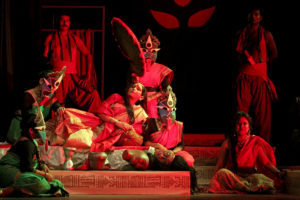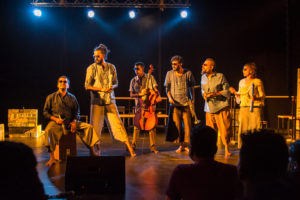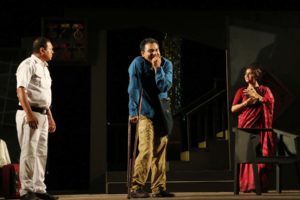Girish Karnad’s Play: Ghoramukho Pala
 Playwright: Girish Karnad
Playwright: Girish Karnad
Director: Sanjib Ray
Group: Kathakriti, Kolkata
Language: Bengali
Duration: 2 hrs 20 mins
The Play
Kapil and Devdutta of Dharmapur are the heroes of our play. One comes from a Brahmin family and the other is a blacksmith’s son. Devdutta falls in love with the daughter of a gold-merchant, Padmini. He vows that if he marries Padmini, he would sacrifice his hands to Ma Kali, and his head to Rudra Dev. Eventually, Devdutta marries Padmini. They visit Ujjayini when Padmini is pregnant. Devdutta becomes furious when he discovers the intimacy between Kapil and Padmini. Sending Kapil and Padmini to the Rudra temple, he goes to the Kali temple and cuts his head off near the feet of Ma Kali. When Kapil returns, he sacrifices his life seeing his friend lying beheaded. Padmini too moves to do the same but Goddess Kali appears and stops her. Abiding by the direction of the goddess, she fixes the heads of Kapil and Devdutta, but on each other’s body. Although the two friends are offered life again by the grace of Ma, their heads are transposed…
Director’s Note
In 1972, Girish Karnad himself translated his play Hayavadana from Kannada into English in the eminent Theatre Journal Enact. The director of the Bengali theatre troupe Nakshatra, Shri Shyamal Ghosh requested the poet and litterateur Shri Shankha Ghosh to translate the play into Bengali at the earliest as the group was determined to stage it as their next production. Unfortunately, it was never performed by the group. Shyamal Ghosh before his demise entrusted Kathakriti to perform this play and it was revised by poet Shankha Ghosh. The present project is thus a modest endeavour of Kathakriti to accomplish the unfulfilled dream of Late Shyamal Ghosh, their preceptor.
The Director
Sanjib Ray, a retired Senior Manager in Allahabad Bank, has directed 9 one-act and 19 full-length plays for Kathakriti. He joined Nakshatra in 1967 and worked with legends like Shyamal Ghosh, Mohit Chattopadhyay, Mamata Chattopadhyay and Navendu Sen; and later worked under the direction of Jnanesh Mukherjee and Sohag Sen. Sanjib joined the drama section of Yuvavani under Akashvani as a news reader, actor, producer and reciter in 1969. He actively participated in audio plays by Akashvani commercial broadcasting. In 1989, he formed his own group Kathakriti and has remained its President-Director. He has also been the chief editor of Kathakriti Natyapatra since its inception. He was awarded the Dishari Purashkar as Best Director twice and the Ritwick Ghatak Memorial Award also as Best Director.
Recently a book, narrating his tireless journey in theatre for the last 50 years, was published and unveiled by eminent actress Smt. Maya Ghosh. At the book launch a number of eminent personalities spoke on his excellence and benevolence.
The Playwright
Girish Karnad (May 19, 1938 – June 10, 2019) was an Indian playwright, author, actor, and film director whose movies and plays, written largely in Kannada, explore the present by way of the past.
The Group
Kathakriti has staged 9 short plays and 19 full-length plays till date under the direction of Shri Sanjib Ray. Kathakriti has also initiated audio plays, workshops and seminars on theatre, in different schools and colleges. It has also performed during the Swachh Bharat Abhiyaan under the Central Ministry. Since its inception, Kathakriti holds a drama festival every year on the occasion of its birthday. The publication Kathakriti Natyapatra is also an asset for drama enthusiasts.
Cast & Credits
On Stage Sanjib Ray, Ashok Ganguly, Nabanita Mukherjee Das, Shambhu Nath Shaw, Dipankar Haider, Bindia Ghosh, Kinjal Nanda, Parijat Das
Dance & Chorus Jayanta Ghosh, Shraddha Chanda, Poulami Bag,
Barnamala Chatterjee, Sayani Roy, Chowdhury Laboni Sarkar,
Mithun Gupta
Singers & Accompanists Shubhadeep Guha, Sushruta Goswami, Pritam Ghosh, Shubhajit Dev, Susmita Sarma, Jayanta Saha
Set Chanchal Haider
Light & Accompanists Dipankar Dey, Ashim Das, Arup Das
Make-up Biswajit Haldar
Backstage Management Sourav Chatterjee, Bapi Sarkar, Arup Kumar Deb
Team Leader Debasish Naskar
Playwright Girish Karnad
Director Sanjib Ray
Contacts
Director, Kathakriti
TG 2/10, Teghoria
Kolkata- 700157
Ph: (033) 24260404
M: +91 9836444886
E: tgkathakriti@gmail.com

